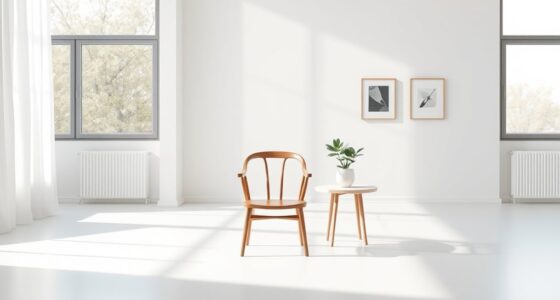Decluttering your space can significantly reduce stress and enhance your well-being. When you organize your environment, you'll find it easier to focus, feel calmer, and boost your mood. Plus, a tidy area improves air quality and helps you sleep better. By taking small steps to declutter, you'll experience the emotional and physical benefits right away. Stick around to discover effective strategies that'll keep your home clutter-free and your stress levels down.
Key Takeaways
- Decluttering reduces cognitive overload, helping to lower stress levels and promote mental clarity in your space.
- A tidy environment fosters a calming atmosphere, boosting mood and reducing anxiety effectively.
- Regular organization practices enhance productivity by minimizing time spent searching for items.
- Clean spaces improve sleep quality and overall physical health by promoting better hygiene.
- Mindfulness during decluttering helps you focus on what truly matters, reducing mental clutter and stress.
Understanding the Connection Between Clutter and Stress

Clutter can feel like a weight on your shoulders, affecting both your mind and body. It restricts your ability to focus, as your brain struggles to process multiple stimuli in a chaotic environment. This visual clutter can lead to cognitive overload, causing stress and mental fatigue.
Research shows that clutter often results in higher levels of life dissatisfaction and mental distress. Interestingly, women tend to experience this stress more acutely, facing higher cortisol levels and feeling a greater mental load from managing clutter. High household object density in one's living space can exacerbate these feelings of stress, further highlighting the need for a decluttered environment. Awareness of these pitfalls can help you recognize the emotional impact of clutter and encourage proactive steps toward organizing your space.
Clutter doesn't just disrupt your space; it impacts your emotional well-being, making you feel overwhelmed and anxious. Understanding this connection can motivate you to take steps toward a more organized and peaceful environment.
The Mental Health Benefits of a Decluttered Space

When you create a decluttered space, you open the door to significant mental health benefits that can transform your well-being. A tidy environment reduces stress and anxiety, creating a calming atmosphere that helps you feel grounded. Studies show that clutter raises cortisol levels, contributing to chaos and overwhelm. By organizing your space, you boost your mood and self-esteem, fostering a sense of accomplishment. Additionally, decluttering your home can indicate a positive shift in your mental health.
A decluttered area also enhances your focus and creativity, allowing for clearer thinking. Furthermore, engaging in continuous learning about organization techniques can further enhance your ability to maintain a tidy environment. Plus, when your bedroom is uncluttered, you're likely to enjoy better sleep quality.
Decluttering promotes emotional well-being, providing clarity and resilience. Regularly maintaining a clean space can become a vital form of self-care, supporting your long-term mental health.
How Decluttering Enhances Productivity

A decluttered environment not only fosters mental well-being but also significantly boosts your productivity. When you clear away distractions, you enhance your focus and maintain mental clarity, making it easier to tackle tasks.
Research shows that 78% of workers believe a tidy workspace improves concentration. Moreover, spending less time searching for misplaced items can save you about 2.5 days each year. Additionally, a clutter-free space is linked to lower cortisol levels, which can further enhance your ability to concentrate and work efficiently. Creating functional living spaces that are organized can greatly improve the overall atmosphere as well.
An organized setup allows for quicker access to tools and promotes efficient time management, reducing stress related to clutter. Regular decluttering sessions help keep your workflow streamlined, while the sense of accomplishment from organizing energizes you to complete other tasks.
Ultimately, a clutter-free space creates a more productive atmosphere, empowering you to achieve your goals.
Physical Health Improvements From Organizing Your Environment

Organizing your environment can lead to significant physical health improvements that enhance your overall well-being. By decluttering, you reduce allergens like dust and mold, lowering asthma triggers and improving air quality. Additionally, organized environments promote a sense of calm, which can further support your physical health by reducing stress levels. Implementing designated zones can also make it easier to locate items, minimizing frustration and enhancing overall efficiency.
Decluttering your space can significantly improve air quality and reduce allergens, enhancing your overall physical health.
Cleaner spaces are easier to maintain, promoting better hygiene and reducing bacteria. A tidy bedroom can also enhance your sleep quality, which is crucial for your physical health. Plus, organized kitchens make it easier to prepare healthier meals, cutting down on fast food reliance. Ultimately, a clutter-free environment can lower your risk of obesity by encouraging healthier choices and habits.
All these factors contribute to a healthier lifestyle, giving you more energy and improving your overall physical health.
Environmental Advantages of Decluttering

Decluttering your space not only creates a more inviting environment but also brings significant environmental benefits. By clearing out unwanted items, you reduce waste sent to landfills and encourage recycling and repurposing. This practice helps conserve natural resources, as extending the life cycle of products decreases the demand for new manufacturing. Moreover, proper disposal of clutter prevents hazardous materials from polluting waterways, reducing environmental harm. Decluttering also fosters sustainable consumption by promoting mindful purchasing decisions and reducing impulse buys. Engaging in secondhand markets supports a circular economy, where goods are reused, minimizing the need for new products. Additionally, it lowers environmental impact by promoting eco-friendly practices through proper disposal and recycling. Furthermore, incorporating high-fiber foods like chia seeds in your diet can enhance your overall wellness while supporting sustainable eating habits. In essence, decluttering contributes to a healthier planet while creating a more organized and enjoyable living space.
Effective Strategies for Decluttering Your Space

When you tackle decluttering, starting small can make a world of difference. Focus on one area at a time, whether it's a drawer or a corner of a room. Set a schedule to consistently dedicate time to this process.
Use the 3-step method: gather trash, put items away, and organize what's left. Consider creating a "maybe" box for items you're unsure about, with a deadline to revisit them. Regular revisits to clutter are necessary for maintenance to ensure you maintain a clutter-free environment. Creating a clutter-free environment can greatly enhance wellness at home, making it a more inviting and peaceful space.
Implement a sorting system—categorize items into keep, donate, sell, and discard. Utilize storage containers and label them for easy access.
Finally, celebrate your progress, no matter how small, as it boosts motivation and reinforces your commitment to a clutter-free space.
Maintaining a Clutter-Free Lifestyle Long-Term

Maintaining a clutter-free lifestyle requires consistent effort and a few mindful habits integrated into your daily routine.
Dedicate a few minutes each day to tidy up, ensuring items return to their designated places. Use efficient storage solutions and establish a labeling system for easy organization. Regular fuel injection cleaning can also help keep your vehicle running smoothly, minimizing stress related to maintenance.
Dedicate daily moments to tidying up and create efficient storage systems to keep your space organized and clutter-free.
Set a cleaning schedule and involve family members to share responsibilities. Implement a "one in, one out" policy to maintain balance in your possessions.
Schedule weekly reviews and seasonal decluttering sessions to reassess what you truly need. Finally, practice mindfulness to manage mental clutter effectively.
Frequently Asked Questions
How Often Should I Declutter My Space?
You should aim to declutter your space regularly to maintain a tidy environment.
Try incorporating a "ten-second tidy" into your daily routine to manage small messes. Each week, focus on one area to prevent overwhelming yourself.
Seasonal decluttering can be a great way to refresh your space, especially during changes or moves.
What Items Should I Prioritize for Decluttering?
You might think decluttering's overwhelming, but tackling it one step at a time makes it manageable.
Start with expired food items in your kitchen and expired medications in your bathroom.
Next, focus on clothing that no longer fits and mismatched socks in your bedroom.
Then, clear out digital clutter by deleting duplicate photos and unused apps.
Prioritizing these items will help you create a more organized, stress-free environment.
Can Decluttering Help With Sleep Issues?
Yes, decluttering can significantly help with sleep issues. When you clear your space, you reduce visual distractions and create a calming environment, promoting better relaxation.
A tidy room also improves air quality, which can enhance your breathing and overall sleep quality. By removing clutter, you lower stress levels and anxiety, making it easier for you to unwind at night.
Ultimately, a clean space fosters a stronger mental association with sleep and relaxation.
How Do I Handle Sentimental Items While Decluttering?
When you're handling sentimental items while decluttering, start by gathering everything in one spot.
Take a moment to assess each piece and acknowledge the emotions tied to them. You might find it helpful to take pictures of items before letting them go.
Set limits on how much space you'll dedicate to these keepsakes, and consider creating a memory box for the most meaningful ones.
It's about balancing memories with a tidy space.
What Are the Best Storage Solutions for Small Spaces?
When you're tackling storage solutions for small spaces, focus on maximizing vertical areas. Use wall-mounted shelves and hooks to keep floors clear.
Consider multi-functional furniture, like storage benches or tables with hidden compartments, to combine style with functionality.
Don't forget about under-bed storage for items you rarely need.
Conclusion
By decluttering your space, you're not just tidying up; you're also clearing your mind and reducing stress. Remember, "a clear space leads to a clear mind." As you embrace the benefits of an organized environment, you'll find improved productivity, enhanced well-being, and even a greater appreciation for your surroundings. So, take a step today toward a clutter-free lifestyle, and enjoy the peace and clarity that comes with it. You deserve it!









